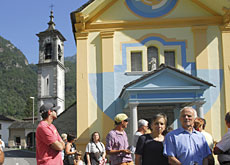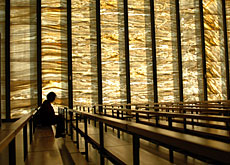Atheists launch non-prophet bus campaign

"There's probably no God. Now stop worrying and enjoy your life." That message, on British buses for just over a month, is coming to Switzerland.
The Swiss freethinkers’ association launched a campaign on Monday to collect donations to “give a voice to those people who feel plagued by the missionary slogans” plastered around the country.
“We did it because so many people asked us to do it,” Reta Caspar, spokeswoman for the association, told swissinfo.
“We hadn’t planned it – we had our own campaign last October in which we invited people to ‘out’ themselves on our website, saying they were non-religious and why.”
Caspar said one of the aims of that campaign was to give faces to the 11 per cent of Swiss who are non-religious.
“When we saw what happened in London and how people were so happy to have a campaign like this and how much support they got, we said we had to do it.”
The Swiss freethinkers’ association, which celebrated its 100th anniversary last year, guarantees that all donations will be used only for the bus campaign.
“People called us and emailed us saying ‘finally – someone is standing up for non-religious people. We’re so fed up with religious advertising in Switzerland everywhere’,” Caspar said.
As an example she cites the biblical quotations on walls and newspapers in Switzerland paid for by the Christian organisation Agentur C.
International success
The Atheist Bus Campaign, which has spread to the United States, was launched by British journalist Ariane Sherine on October 21 in response to a Christian bus advertisement which led people to an internet link saying non-Christians would spend “all eternity in torment in hell”, burning in “a lake of fire”.
The campaign’s original goal was to raise £5,500 (SFr9,150) to run its own counter slogan on 30 buses across London for four weeks. Within three days more than £100,000 had flooded in.
The first “atheist buses” started running on January 6 and 800 ended up getting stuck in traffic jams around Britain for four weeks. Future plans include placing 1,000 adverts on the London Underground featuring quotations from famous atheists.
In response, three Christian groups launched counter campaigns with slogans including “The fool hath said in his heart, There is no God”.
Fed up
Caspar says their initial target is Fr50,000 ($43,000) – “actually I think we could make SFr100,000” – and explains it would cost about SFr5,000 to take out one advert on a tram or bus for one year in a city. It’s a bit cheaper in the countryside.
“With the money starting to come in, we can see where it’s coming from. That will influence our decision on where to spend it,” she said.
But she adds that it’s not actually their aim to make as much money as possible.
“We want to show that there really are a lot of people, internationally, fed up with not only religious advertising but also the religious speak of politicians,” she said.
“What made us really angry was when the Swiss president [Hans-Rudolf Merz] ended his New Year address with the sentence ‘relying on our mutual beliefs we are going to meet the challenges of the New Year’. We wrote to him asking what ‘our mutual beliefs’ were. He confirmed receipt of our letter but hasn’t replied. He said he’s working on it.”
Counter campaign
Reactions to the campaign in Switzerland have been mixed.
The main national churches didn’t want to comment and the centre-right Christian Democratic Party said it only took a stance on political matters not religious ones.
The Protestant Party on the other hand said it was considering a counter campaign.
Simon Weber, spokesman for the Federation of Swiss Protestant Churches, told swissinfo: “You could also say the opposite: there probably is a God – don’t worry, enjoy your life.”
He added: “Preaching about God and salvation is the church’s mission and it’s been doing that for 2,000 years. If someone says something different, that’s nothing new – although it’s new in this form. The campaign in Britain didn’t trouble us.”
Positive
Caspar points out that their campaign, Geniess das Leben! (Enjoy Life!), is positive. She adds that the subtitle – “für religiöse Abrüstung” – is a call for religious disarmament.
“The Reformed Protestant church in Basel has launched a tram that is covered with all sorts of statements about the church for one year. They’re trying to get back the 2,000 or so people who left the church over the past couple of years.”
This, she says, is a type of “arming”, with everyone starting to fight for members and power in society.
“We think this is really counterproductive and it has to stop.”
swissinfo, Thomas Stephens
More than one in ten of the Swiss population – 810,000 people – claims “no religious affiliation”, up almost 60 per cent on a decade earlier.
They form the third-largest “religious group” in Switzerland after the Protestant and Roman Catholic churches, accounting for a little over 11 per cent of the population.
Equally significant is the number of people who gave no indication of their religious orientation in the most recent census: 315,800 – triple the number ten years earlier.
Reta Caspar from the Swiss freethinkers’ association says the sharp rise in the number of non-believers is proof that religion has become increasingly irrelevant, especially among younger generations. She claims more and more young people see churches as out of touch, because of their “outmoded” stance on issues such as abortion, homosexuality, contraception and evolution.
Evidence of this can be seen in the 2000 census, which showed a substantial increase in the number of people aged 20-39 claiming no religious affiliation compared with ten years earlier.
A more recent publication paints an even bigger picture of secularism in Switzerland.
According to the Cambridge Companion to Atheism, published in 2006, up to a quarter of Swiss say they are “atheist, agnostic or non-believers in God”.

In compliance with the JTI standards
More: SWI swissinfo.ch certified by the Journalism Trust Initiative












You can find an overview of ongoing debates with our journalists here . Please join us!
If you want to start a conversation about a topic raised in this article or want to report factual errors, email us at english@swissinfo.ch.